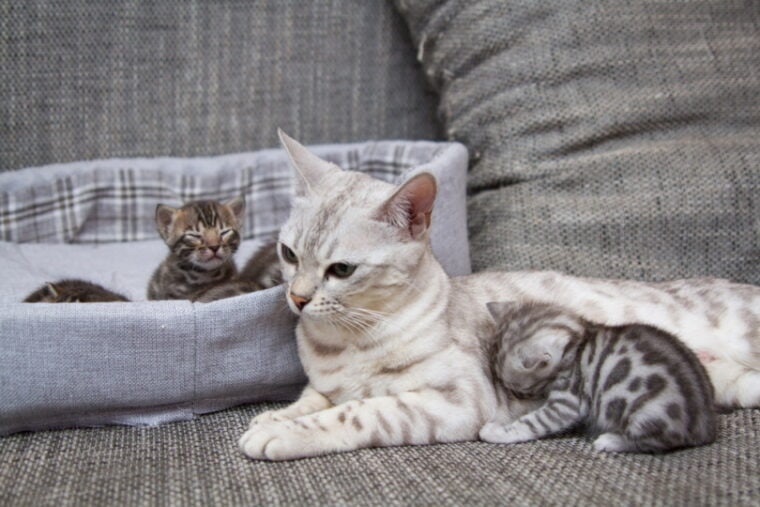
Cats are very attentive mothers. They groom their kittens, teach them to hunt, and show them the ways of the feline world. They will continue to do this as long as the kittens remain part of the same community. However, once mother cats wean their kittens, they lose interest in them and no longer associate them as family, even though they may still recognize them as an individual. Likewise, once mature, kittens may be able to identify their mothers as a cat they know but not in the context of a relationship; cats can often breed with their own mothers or siblings without the ability to discern their relationship.
Cat Memory
The question of whether cats would ever remember their kittens, and if kittens would remember their mothers requires us to understand how the cat’s brain works. The cat brain is similar to most other mammalian brains, like humans. It has special parts for remembering things, like:the temporal lobe, amygdala, and the hippocampus. These parts help cats store and recall memories. Cats also have something called a limbic system, which controls their feelings and behavior.
Just like people can have memory problems when they get older, cats can also experience something similar, called dementia (also known as cognitive dysfunction syndrome), which closely resembles Alzheimers in humans. This means that if cats can lose their memory, it suggests that they had memories in the first place.
So, to answer the question, yes, cats do have the ability to remember their kittens, and vice versa. Their brains are designed to remember things, but they behave differently toward their family members than humans do.

How Long Does a Mother Cat Remember Her Kittens?
The length of time a mother cat remembers her kittens is disputed, cats have a memory that’s able to recall events from many years ago (up to ten years) 1. Cats rely on memory to remember favorable hunting, hiding, nesting, and breeding areas. Therefore, a cat’s ability to remember that she had kittens is probably intact well after they’re gone.
However, hormonal triggers prompt cats to wean their kittens, and once cats wean their kittens, they seem to lose interest in them in a matter of weeks and don’t associate them with family anymore and instead, treat them as other cats.
However, that doesn’t mean a cat’s memory is fleeting when it comes to her kittens. Instead, she probably just treats them as other cats out of instinct. The reasoning for this is because cats will quickly recognize and tend to their lost kittens that are separated from them and reunited before they are weaned.
In domestic cats, the ability to dissociate from motherhood is important from a survival perspective; cats need to be able to continue reproducing when conditions allow for it. This is also why many cats will readily mate with their offspring or siblings if the opportunity presents itself as the need to propagate in most species (including cats) is instinctive and not a preference. In addition, this ability to treat kittens as complete strangers is also useful for cats if they choose to abandon their kittens (if they think their kittens aren’t healthy enough).
In some wild feline species, at times females tend to remember their female offspring and tolerate them in their home range even after they’ve been weaned. Cheetahs, leopards, and tigers have all exhibited this behavior on occasion, as noted by naturalists. Female cubs, once mature, often share a home range with their mothers and interactions between them are usually non-violent (though they tend to avoid each other if possible). Male cubs on the other hand usually travel far away from their mother’s territory once weaned.
Therefore, though cats may have the memory to remember their kittens, they may appear to not do so because they no longer consider them as such once they’re weaned.

How Long Do Kittens Remember Their Mothers?
On the flipside, things are likely the same for kittens. Kittens have a remarkable ability to recognize their mothers from a very young age. 2 In experimental studies, kittens were able to recognize their mother’s unique chirps once they were around 3 weeks old. Interestingly, this is also the time mother cats announce their arrival to a nest via a chirp. Because a kitten’s ears are likely open and hearing well developed by this age, this might be the reason why mother cats opt to use their chirps at this age, and not earlier.
However, once weaned, kittens tend to lose interest in their mother and often don’t associate her as a mother anymore. They may also lose interest in their siblings, and some cats may form closer bonds with “stranger” cats they’re housed with rather than their own mother or siblings once they’re weaned.
Cognition in kittens is thought to really kick in once they are about 3 weeks old 3, this is when they start learning social skills, play, and other cognitive skills which they continue to use throughout their life. Many skills are taught by their mothers, which is why it’s not beyond the realm of possibility that they remember their mothers, however, they may instinctively dissociate their relationship with them as they’re weaned and mature.
Final Thoughts
Though cats have extensive memories and cognitive abilities, they don’t seem to remember the relationship between their offspring, and likewise, kittens usually don’t associate their mothers as such after they’re weaned. However, this is likely due to a natural instinctive process rather than a failure of cognitive development or ability.
See Also:
- Does A Cat Recognize What a Human Baby Is? The Surprising Answer!
- Will a Mother Cat Abandon Her Kittens If Touched By Humans? Vet Reviewed Facts & FAQ
Featured Image Credit: TalyaPhoto, Shutterstock







